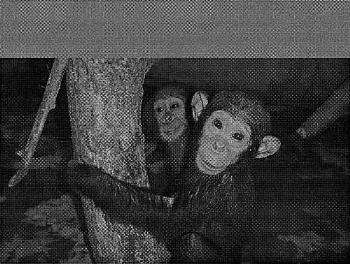|
Orphanage of Great Ape Babies
Augustin Kanyunyi Basabose Head, Department of Biology, Laboratory of Primatology, CRSN-Lwiro, DS Bukavu, R.D. Congo, augubasabose@yahoo.com Background The forests of eastern Democratic Republic of Congo are home to 96% of the world’s eastern lowland gorillas (Gorilla gorilla graueri) and large populationas of Chimpanzees (Pan troglodytes schweinfurthi); however instability resulting from the war in the eastern Congo (former Zaire), has led to a slaughter of a large number of these great apes. In the montane sector of Kahuzi-Biega National Park, a recent gorilla census done in 2000 (Omari, Wildlife Conservation Society, unpub. data) revealed half of the population was killed for meat. Only 130 gorillas have survived from the 258 individuals counted in 1996 (Inogwabini et al., African J. of Ecology 38:269-276, 2000). In addition, poachers illegally bring many gorillas and chimpanzees babies to cities in the region such as Bukavu. Kahuzi-Biega Park staff in collaboration with the Centre de Recherche en Sciences Naturelles (Lwiro) has launched a campaign to search and confiscate ape babies brought by the poachers to Bukavu and has created an orphanage at the CRSN (Lwiro) station. The orphanage project has already received six chimpanzee babies. The poachers have been seriously punished and brought before the courts to be judged and jailed. Aim of the Orphanage Project In confiscating those animals from the hands of poachers and bringing them before the courts where they pay high amends, we hope to discourage poaching activity of these endangered species at the brink of extinction in the great lake region. This is a conservation effort seen as a part of a systematic approach at regional and local scale. The Orphanage Project is another part of this approach. The goal of the Project is to keep the confiscated ape babies in a protected, but healthy environment until they are old enough to live freely in the forest without special care. The park accepted this plan to reintroduce them into Kahuzi-Biega. However, we will need assistance from other specialists to achieve this task. Funding Support Required We have been receiving some assistance ($50 US per month) from the park to launch the project, but this is not enough to support the daily living cost of the six animals we now have in the orphanage. In addition, this support from the park will stop at the end of July 2002 and renewal is not guaranteed. We are now looking for an additional financial support for our Orphanage Project. Our hope is that the international community, which focuses on animal conservation and especially great apes, might support our effort to bring back hope to these threatened animals. We urgently need approximately $5,900(US). This support would be used for rehabilitation of the housing and much needed equipment ($1,400 US); an education campaign ($900 US) and daily living costs ($3,600 US), including food, care and medicines for eighteen months.  Reference:
Reference:Dr. Juichi Yamagiwa Associate Professor Laboratory of Human Evolution Studies, Department of Zoology Kyoto University, Sakyo-ku, Kyoto 606-8502, JAPAN Tel: +81-75-753-4108; Fax: +81-75-753-4098 e-mail: yamagiwa@jinrui.zool.kyoto-u.ac.jp
Baby Chimpanzees in the Orphanage at Lwiro
© A.K. Basabose, 2002 Back to Contents |